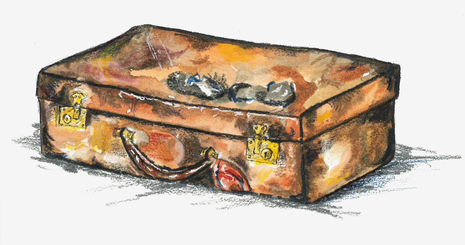Can we break our addiction to short-haul flights?
Making the case for sustainable travel, Harrison Whitaker points out the need to reexamine student attitudes towards short-haul flights

The university’s report on sustainable travel, released earlier this year, leads with a jaw-dropping figure: 95% of carbon emissions from business trips taken by staff and students came from flights. For comparison, that’s roughly equivalent to the emissions created by the university’s entire space and water heating system. It comes as no surprise, then, that the report also outlines a new set of guidelines for reducing travel emissions, such as attending conferences virtually and using ground transport wherever possible. With the spectre of climate change looming so large over the lives of young people, surely we, as students, will be taking just as firm a stance on this issue?
“Young people at this university and beyond seem positively flight-drunk”
A quick once-over seems to suggest otherwise. Hardly a weekend goes by without someone I know hopping on a flight to Milan, Majorca, or Mykonos for a brief holiday. Young people at this university and beyond seem positively flight-drunk, snapping up cheap tickets at any opportunity without a consideration of what impact purchasing them may have. Increased awareness about the impact of aviation on the climate is ultimately doing little to alter behaviour: the number of flights in the EU is expected to fully recover from the impact of COVID by the end of this year and continue on an upward trend thereafter.
One of the most common responses I hear when I bring up this issue with a peer is one of avoidance. Could buying one ticket on one flight really make that much of a difference? The short answer is yes: a single return ticket from London to Rome is responsible for more greenhouse gas emissions than the average citizen of Pakistan or Honduras over the course of an entire year.
“The point here is elimination where possible, reduction everywhere else”
The long answer is, of course, more complicated than this. Aviation counts for between 2 and 3 percent of global emissions. As small as that figure may sound, it’s magnified by the sheer enormity of the world’s fossil fuel addiction: the world’s airplanes emit about as much carbon as all 125 million inhabitants of Japan. Not boarding a flight to Prague isn’t going to solve this overnight, but it may well be the best solution we have right now. Aviation is notoriously difficult to decarbonise, as sustainable biofuels are scarce and electric short-haul flights are still years or decades away from commercialisation. If there is an ‘answer’ to the question of flying at this moment, it is simply not to fly.
The response I get most often, however, is even more frustrating: one of sympathy. Cambridge is full of climate-conscious people, many of whom are ready to agree with the points I make, bemoan the state of our climate, and book a ticket out of Stansted later that day. It’s difficult to say exactly what’s behind this — apathy? defeatism? cognitive dissonance? — but what is clear is that the effect is all the same. No matter how much you believe in climate change, how badly you want it to be solved, the carbon you put into the atmosphere is the same as everyone else’s.
Unfortunately, there is no simple prescription for a condition so complex. I’m from the United States, I’ll be flying home this summer to visit my family, and I certainly don’t judge anyone else who does the same. Traveling green is often more expensive and can be fiscally unrealistic for large swaths of people; if it’s cheaper to fly to Jamaica than get a train from Manchester to London, something’s not right. We live in a world lethally dependent on fossil fuels, so it’s no surprise that avoiding them can be all but impossible in some cases.
The point here is elimination where possible, reduction everywhere else. I can wake up in Cambridge and be in Paris by midday, Amsterdam by the early afternoon without ever setting foot in an airport thanks to Eurostar. I can attend most conferences in my field virtually, and my decision not to take holiday flights has inspired me to visit some of the UK’s most beautiful and underappreciated areas.
That’s not to say that there isn’t some sacrifice involved. I understand the desire to buy cheap flights and traipse around Europe, and I’ve been invited on a few trips I otherwise would’ve liked to join. All the same, there are greater factors at play. When Madagascar’s climate minister, in the throes of his nation’s most lethal drought in recent memory, claims that fault rests at the feet of “cheap European flights,” do we ignore him? Or do we think twice before we plan our next trip abroad?
 News / Hundreds of Cambridge academics demand vote on fate of vet course20 February 2026
News / Hundreds of Cambridge academics demand vote on fate of vet course20 February 2026 News / Judge Business School advisor resigns over Epstein and Andrew links18 February 2026
News / Judge Business School advisor resigns over Epstein and Andrew links18 February 2026 News / University Council rescinds University Centre membership20 February 2026
News / University Council rescinds University Centre membership20 February 2026 News / Petition demands University reverse decision on vegan menu20 February 2026
News / Petition demands University reverse decision on vegan menu20 February 2026 News / Caius students fail to pass Pride flag proposal20 February 2026
News / Caius students fail to pass Pride flag proposal20 February 2026










